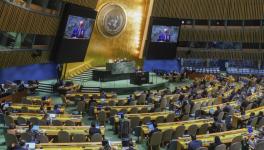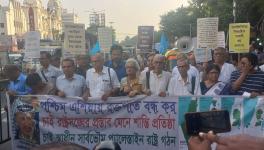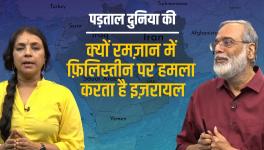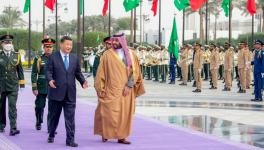“Disgusting” – Susan Rice, US Ambassador to the UN.
When the Moroccan resolution on Syria failed at the UN Security Council because of the double veto (from the Russians and the Chinese), the US Ambassador to the UN Susan Rice proclaimed that it was “disgusting and shameful.”
Outside the chamber, Rice said that the Resolution would have “aligned the international community behind a process in which both sides had to come together and on a very swift timetable negotiate a transition to a new democratic regime.” In other words, the “international community” would lean on the regime of Bashar al-Assad to “step aside” and allow an alternative government to be formed which would include the various factions that are currently outside Syria (with some representation from within). Unusual for a diplomat, Rice then said that “any further blood that flows will be on their hands,” namely on the hands of the Russians and the Chinese.
Like Samantha Power (Special Assistant to President Obama), Rice was deeply marked by the Rwandan Genocide. A member of Bill Clinton’s National Security Council at that time, Rice told an interagency conference call in April 1994, “If we use the word ‘genocide’ and are seen as doing nothing, what will be the effect on the November [congressional] elections.” This remark shocked the others in the room, who recounted it to Samantha Power (then a journalist, who wrote it up in The Atlantic). Rice disavowed the sentiment. She later told Power, “There was such a huge disconnect between the logic of each of the decisions we took along the way during the genocide and the moral consequences of the decisions taken collectively, I swore to myself that if I ever faced such a crisis again, I would come down on the side of dramatic action, going down in flames if that was required.” Power’s article became the centerpiece of her Pulitzer Prize winning book A Problem from Hell: America and the Age of Genocide (2002).
In Obama’s team, Rice and Power are on the side of dramatic action. They were the ones who pushed for intervention into Libya. Syria is simply the next station for their Calvary Road.
Rice and Power have a long history of selective outrage. Genocides are only those when the perpetrators are not among the Atlantic powers. The long finger is pointed at the Eastern Europeans and the Africans – never at the United States government. Thousands certainly died in Kosovo, but hundreds of thousands died in Iraq and East Timor – two states where the US was either the perpetrator or the benefactor. The word “genocide” has been sequestered to US imperial ends, with Rice and Power disgusted with the violence of others but not of themselves.
There is no disgust at the consistent egging on by the US of the Pakistani military to act against its own people, the most egregious being the campaign in the Swat Valley where hundreds of thousands of people lost their lives and were rendered displaced. An Amnesty International briefing pointedly noted, “The Pakistani government’s response to the rise of insurgents in the NWFP’s Malakand Division (mainly in the Lower Dir, Buner, and Swat valley) and in the Tribal Areas fluctuates between launching often indiscriminate and disproportionate military operations that harm mainly civilians and abandoning Pakistani citizens to abusive militant groups. Security forces deployed in government operations often fail to differentiate between civilians and militants and use disproportionate force, causing civilian deaths and injuries and destroying civilian property. Such disregard for civilian life and civilian infrastructure, such as homes and schools, is common throughout the region.” It is not just the Pakistani government that came in for criticism by Amnesty, but its “international backers – notably the United States,” who have said that the aim is not to protect civilians but to pursue “military and counterterrorism objectives, with often fatal consequences for civilians.”
Rice was not disgusted. Her disgust is not moral. It is calibrated to the interests of US foreign policy. If she were disgusted she would be more forceful against the nature of US and Pakistani operations against the ordinary civilians of Pakistan, just as she would be turned off by the close association between the US government and the government of Equatorial Guinea (which she had once called the “poster child of undemocratic practices”).
Everyone around the table at the UNSC is morally compromised. That is the best place from which to begin serious negotiations about how to best assist the political problems in Syria. Sanctimoniousness might help Rice with her own guilt around Rwanda, but it will do nothing for the Syrian people, who are going down in flames because of the maximalist obduracy of all sides.
Get the latest reports & analysis with people's perspective on Protests, movements & deep analytical videos, discussions of the current affairs in your Telegram app. Subscribe to NewsClick's Telegram channel & get Real-Time updates on stories, as they get published on our website.
























